- Home
- Hugo Hamilton
The Speckled People Page 4
The Speckled People Read online
Page 4
‘There will be no more fighting and dying,’ my father says. He wants no more people put out of their houses, because it’s time to live for Ireland and stop arguing among ourselves over stupid things. He says there are too many things to do and too many places to see in Ireland like the round tower in Glendalough and the new IMCO building that looks like a white ship when you pass it by on the bus. My father pays the fare in Irish and sometimes when the bus turns around the corner you think you’re going straight into a shop window. We go to the zoo and have a picnic in the Phoenix Park with a big spire in the distance called the Wellington Monument. We run across the grass, but we’re not allowed to play on the monument because it’s something the British left behind and forgot to take with them. Wait till we get our own monuments, my father says.
There are parts of the song, too, that my father will not tell us anything about. Some of the verses are to do with the town of Leap and things he doesn’t want to remember. Like the picture of the sailor over the mantelpiece. Or the people in the town who used to laugh at him for having a father who fell and lost his memory in the navy. It was a bad thing to have a mother who was still getting money from the King of England. So they called him names and said he would never be able to jump across the gorge.
‘Every curse falls back on its author,’ my father says.
He promises to bring us to see his own home town, but he never does. Instead, he would rather show us the future, so that’s why there are verses of the song he leaves out altogether. He lost his memory when he was small and vowed instead that he would be the first person who really leaped over the gorge since O’Donovan did it. He said they were not beyond British law as long as they were still depending on Britain for their jobs and still speaking English. So when the time came, my father jumped. He didn’t emigrate or drink whiskey or start making up stories either. Instead he changed his name and decided never to be homesick again. He put on a pioneer pin and changed his name from Jack to Seán and studied engineering and spoke Irish as if his home town didn’t exist, as if his own father didn’t exist, as if all those who emigrated didn’t exist.
There are things you inherit from your father, too, not just a forehead or a smile or a limp, but other things like sadness and hunger and hurt. You can inherit memories you’d rather forget. Things can be passed on to you as a child, like helpless anger. It’s all there in your voice, like it is in your father’s voice, as if you were born with a stone in your hand. When I grow up I’ll run away from my story, too. I have things I want to forget, so I’ll change my name and never come back.
My father pretends that England doesn’t exist. It’s like a country he’s never even heard of before and is not even on the map. Instead, he’s more interested in other countries. Why shouldn’t we dance with other partners as well, he says, like Germany? So while he was still at university he started learning German and listening to German music – Bach and Beethoven. Every week he went to classes in Dublin that were packed out because they were given by Doctor Becker, a real German. He knew Germany was a place full of great music and great inventions, and one day, he said to himself, Ireland would be like that too, with its own language and its own inventions. Until then, he said, Ireland didn’t really exist at all. It only existed in the minds of emigrants looking back, or in the minds of idealists looking forward. Far back in the past or far away in the future, Ireland only existed in songs.
Then he started making speeches. Not everybody had a radio and not everybody could read the newspapers at that time, so they went to hear people making speeches on O’Connell Street instead. The way you knew that people agreed with what you were saying is that they suddenly threw their hats and caps up in the air and cheered. The biggest crowd with the most amount of hats going up was always outside the GPO for de Valera. Some people had loudspeakers, but the good speakers needed nothing, only their own voices, and my uncle Ted says the best of them all was further up the street, a man named James Larkin who had a great way of stretching his arms out over the crowd.
My father wouldn’t throw his hat up for anyone, so he started making his own speeches at the other end of the street with his friends. They had their own newspaper and their own leaflets and a party pin in the shape of a small ‘e’ for Éire: Ireland. He said it was time for Ireland to stand up on its own two feet and become a real country, not a place you dreamed about. The Irish people spent long enough building stone walls and saying the opposite. There were no rules about starting a new country and he wasn’t interested in saying what everybody agreed with either. He had his own way of bringing his fist down at the end of a sentence, like he was banging the table. Hats went up for him all right. He had the crowd in his pocket when he put his hand on his heart, and he could have stolen all the flying hats from de Valera and Larkin and Cosgrave, but he started speaking in Irish and not everybody understood what he was saying.
One day he bought a motorbike, a BSA, so he could drive all around the country making speeches in small towns. Up and down the narrow roads he went, with his goggles on and his scarf flying in the wind behind him and the music of Schubert songs in his ear. He said Ireland would soon be like Germany with its own great culture and its own great inventions. He told them Ireland could never fight with the British in a war against Germany. Sometimes he stopped to say a prayer if there was a shrine by the roadside. Or to speak to somebody in Irish. And sometimes he had to stop because of cattle on the road, until the farmer cut a passage for him through the middle and the big cow faces got a fright and started jumping to escape in all directions from the noisy new sound of the motorbike driving through.
And then my father had the big idea of bringing people from other countries over to Ireland. After the war was over he met my mother in Dublin and decided to start a German-Irish family. He was still making speeches and writing articles for the newspaper and going around on his motorbike wearing goggles. But what better way to start a new country than marrying somebody and having children? Because that’s what a new country is, he says, children. In the end of it all, we are the new country, the new Irish.
So that’s how the film ends and the song goes on. My mother never imagined meeting someone, least of all an Irishman who could speak German and loved German music. She never imagined staying in Ireland for good, talking about Irish schools or making jam in Ireland and picking out children’s shoes. My father asked her if she was willing to accompany him on a walk and correct his pronunciation. And because Germany had such great music, he wanted to tell her something great about Ireland, about St Patrick and about Irish history and Irish freedom. He told her he was not afraid to make sacrifices. He spoke quickly, as if he was still making a speech and people were throwing their hats up in the air by the thousands and didn’t care if they ever came back down again.
My mother said she had to go home to Germany because that was a country that had just got its freedom, too, and had to be started from the beginning. He would not emigrate or leave his own native shores. He said he had bought a house that was not far away from the seafront. There were no pictures on the walls yet. There was no furniture, only a table and two chairs in the kitchen and a statue of the Virgin Mary. At night, you could be lonely and you’d miss your people because it was so quiet and so empty, just listening to the radio with a naked light bulb in the room and the wallpaper peeling on the walls. But in the end of it all, you would be starting a new republic with speckled Irish-German children.
They got married in Germany at Christmas. It all happened very quickly, because you had to do things immediately, without thinking too much. She didn’t get a white dress but she got snow instead, thick silent snow. They went on the train together along the Rhine. They talked about the future and he said she would always be able to speak German in her own home. She said she would try and learn Irish, too. The children would be dressed for Ireland and for Germany. She said she was good at baking and telling stories. He said he was good with his hands. He said he would buy
a camera so he could take lots of photographs, and she said she would keep them in a diary along with their first locks of hair. She said she would write everything down, all the first words and the first tears and everything that was happening in the news around the world.
There were things they didn’t talk about. She kept her secret and he buried his past as well. He hid the picture of his own father in the wardrobe. He didn’t want to offend her, having photographs of a British sailor hanging in the house. But she had nothing against England. It was not a marriage against anything, but for something new, she said. My mother even invented a new signal so that we would never get lost. A whistle made up of three notes, two short notes dropping down to one long note, like a secret code that no other family in the world would recognise.
They went to a mountain in each country. And no two mountains could be any more different. First they went to the famous Drachenfelz, right beside the River Rhine. They stayed in the hotel at the top and had breakfast looking out across the river below them, at the barges going up and down without a sound, like toy boats. She collected the train tickets and hotel receipts, even the thin decorated doilies under the coffee cups. Everything was important and would never be forgotten. She would not forget the smell of the sea either, or the smell of diesel fuel, or the faces of Irish people on the boat coming across to Ireland. They went up to a famous mountain in Ireland called Croagh Patrick to pray. It was a much harder mountain to climb and some people were even going up in their bare feet, with sharp rocks all along the path. At one point the wind came up so quickly they had to hold on to the rocks with their hands. There was no cable car. There was no hotel at the top either, where you could have coffee and cake. But when they reached the small church at the top and heard the voices of people praying the rosary together, there was a great view. They looked back down at the land all around them, with tiny houses and tiny fields and islands going out into the Atlantic.
Six
Inside our house is a warm country with a cake in the oven.
My mother makes everything better with cakes and stories and hugs that crack your bones. When everybody is good, my father buys pencil cases with six coloured pencils inside, all sharpened to a point. I draw a picture of the fox with blood around his nose. And Franz draws a picture of the house, with everybody in separate rooms – Vati, Mutti, Franz, Hanni and Maria, all standing at different windows and waving. Áine is gone away to London. The O’Neills are gone away, too, so there’s no chopping wood and no English and everybody in our house is in the same country, saying the same words again.
It’s Sunday and there’s a smell of polish on the floor. There is a smell of baking and ironing and polish all over the house, because Onkel Ted is coming for tea. Onkel Ted is my father’s brother, a Jesuit priest, and he comes to visit us after his swim at the Forty Foot. His hair is still wet and combed in lines. He once saved my father’s life, long before he was a priest, when they were still at school and used to go swimming down in Glandore, not far from where they lived. My father started drowning one day so his younger brother had to jump in in his shirt to rescue him. Afterwards my father couldn’t speak because he was shivering for a long time. But we don’t talk about that now. Onkel Ted can speak German, too, but he doesn’t say very much and my mother says he’s not afraid of silence. So he listens instead and nods his head. I tell him that Franz has shadows around his eyes because he fell off the wall and broke his nose, but my mother says we won’t talk about that now. My mother is trying to prove how decent and polite the Germans are and Onkel Ted is trying to prove how decent and polite the Irish are. And then it’s time to reach into his jacket pocket for the bag of sweets and we can have two each and no more.
Outside our house is a different place.
One day my mother let us go down to the shop on our own, but she gave us a piece of rope and told us all to hold on to it so we would not get separated. An old woman stopped and said that was a great way of making sure we didn’t get lost. My mother says we’re surrounded by old women. Miss Tarleton, Miss Tomlinson, Miss Leonard, Miss Browne, Miss Russell, Miss Hosford, two Miss Ryans, two Miss Doyles, two Miss Lanes, Mrs Robinson, Mrs McSweeney and us in between them all. Some of them are friendly and others hate us. Some of them are Protestant and others are Catholic. The difference is that the Protestant bells make a song and the Catholic bells only make the same gong all the time.
You have to be careful where you kick the ball, because if it goes into Miss Tarleton’s garden next door you’ll never get it back. She told us not to dare put a foot inside her garden. Mrs McSweeney is nice and calls you in for a Yorkshire Toffee. The two Miss Lanes across the road have a gardener who wanted to give you back the ball one day but he couldn’t. He came to the gate, ready to hand it back, but then one of the Miss Lanes appeared at the window and shook her head. The gardener stood there, not knowing what to do. We begged him please to give it back quickly before she came out, but he couldn’t because he was working for Miss Lane, not for us, and she was already at the door saying, ‘Give that ball here.’ She said she was going to ‘confiscate’ it. We stood at the railings until Miss Lane said: ‘Clear off. Away from the railings. Go on about your business, now.’
My mother laughs and says ‘confiscate’ doesn’t mean kill or stab with a knife. It just means taking control of something that belongs to somebody else. One day I confiscated my brother’s cars and threw them over the back wall into Miss Leonard’s garden, but we got them back. One day Miss Tarleton declared a football amnesty and we got nine balls back, some of which never even belonged to us in the first place and most of which were confiscated all over again very shortly after that. Miss Tarleton might as well have handed them straight over to the Miss Lanes. My mother wants to know if the Miss Lanes play football in the kitchen at night. And she wants to know what the Miss Lanes have against her, because they just slammed the door in her face.
My mother says maybe they still hate Germany, but my father says they hate their own country even more. He says they still think they’re living in Britain and they can’t bear the sound of children speaking German on the street and, even worse, Irish. My mother says that means we have to be extra-nice to them, so they don’t feel left out. You have to try not to throw the rockets up so high because the bang frightens old women and makes them think the Easter Rising is coming back again. You have to make sure the ball doesn’t go into their garden. My father says it’s your own fault if you lose the ball, because their garden is their country and you can’t go in there. He says our country is divided into two parts, north and south, like two gardens. He says six counties in the north have been confiscated and are still controlled by Britain. The difference between one country and another is the song they sing at the end of the night in the cinema and the flag they have on the post office and the stamps you lick. When my father was working in the north of Ireland once, in a town called Coleraine, he refused to stand up in the cinema because they were playing the wrong song. Some people wanted to put him against the wall and shoot him. And then he left his job and came back to his own country where he could speak Irish any time he liked.
So, you have to be careful what country you kick your ball into and what song you stand up for in the cinema. You can’t wave the wrong flag or wear the wrong badges, like the red poppies with the black dot in the middle. You have to be careful who to be sad for and not commemorate people who died on the wrong side.
My father also likes to slam the front door from time to time. And he’s the best at slamming doors because he makes the whole house shake. Lots of things rattle. Clocks and glasses and cups shiver all the way down to the end of the street when my father answers the door. He sends a message out all over the world, depending on who knocked. If it’s the old woman with the blanket who says ‘God bless you, Mister’, and promises to pray for him and all his family, if it’s the man who sharpens the garden shears on the big wheel or if it’s somebody collecting for the missions, then h
e gives them money and closes the door gently. If it’s people selling carpets he shakes his head and closes the door firmly. If it’s the two men in suits with Bibles then he slams it shut to make sure not even one of their words enters into the hall. And if it’s one of the people selling poppies, then he slams it shut so fast that the whole street shakes. Sometimes the door slams shut in great anger of its own accord, but that’s only because the back door has been left open and there’s a draught going through the house.
One day Mr Cullen across the street asked us to help him wash his car. Afterwards he gave us a whole chocolate bar each, because he works for Cadbury’s and has boxes and boxes of chocolate bars and Trigger bars in the boot of his car all the time. A woman came along the street selling the red badges with the black dot in the middle, so, as well as the chocolate, he bought us each a badge and pinned them to our jumpers. Lots of people on the street were wearing them – Miss Tarleton, Mrs Robinson, Miss Hosford, and the two Miss Lanes.

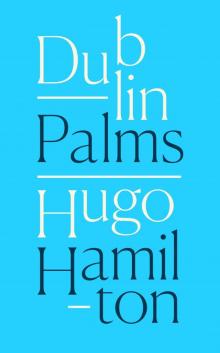 Dublin Palms
Dublin Palms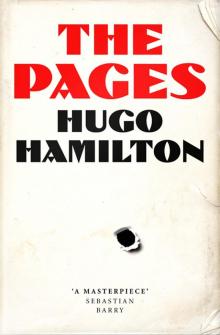 The Pages
The Pages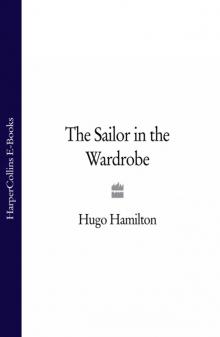 The Sailor in the Wardrobe
The Sailor in the Wardrobe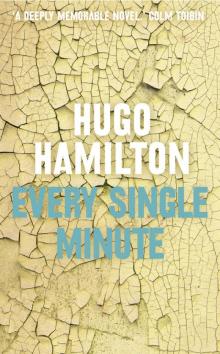 Every Single Minute
Every Single Minute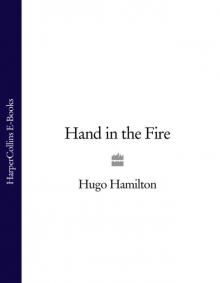 Hand in the Fire
Hand in the Fire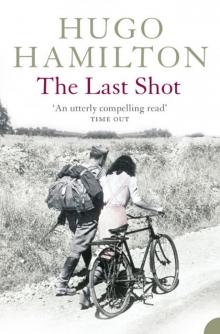 The Last Shot
The Last Shot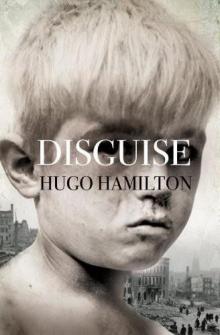 Disguise
Disguise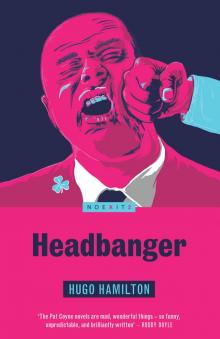 Headbanger
Headbanger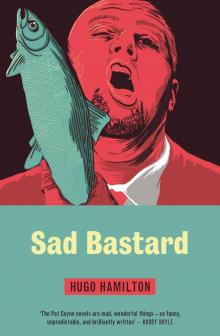 Sad Bastard
Sad Bastard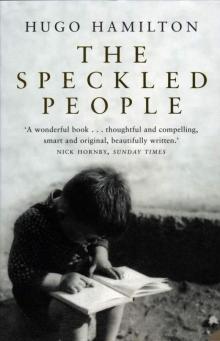 The Speckled People
The Speckled People